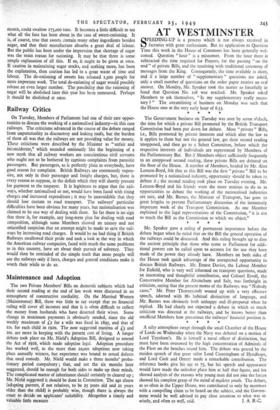AT WESTMINSTER
SPEEDING-UP is a process which is not always received in factories with great enthusiasm. But its application to Question Time this week in the House of Commons has been generally wel- comed. Question " hour " is a misnomer. From the hour there is subtracted the time required for Prayers, for the passing "on the nod " of private Bills, and the receiving with traditional ceremony of messages from the King. Consequently, the time available is short, and if a large number of " supplementary " questions are asked, only a small number of questions on the order paper receive an oral answer. On Monday, Mr. Speaker took the matter so forcefully in hand that Question No. 108 was reached. Mr. Speaker asked Members to ask themselves, " Is my supplementary really neces- sary ? " The streamlining of business on Monday was such that the House rose at the very early hour of 6.53.
The Government business on Tuesday was over by seven o'clock, the time for which a private Bill promoted by the British Transport Commission had been put down for debate. Most " private " Bills, i.e., Bills promoted by private interests and which alter the law as it applies to them but not the general law, get their second reading unopposed, and then go to a Select Committee, before which the respective interests of individuals are represented by Members of the Parliamentary Bar. But if Members object sufficiently frequently to an unopposed second reading, these private Bills are debated on the floor of the House. A number of Members, headed by Mr. Alan Lennox-Boyd, felt that as this Bill was the first " private " Bill to be promoted by a nationalised industry, opportunity should be taken to debate it ; the second reading took place on Tuesday evening. Mr. Lennox-Boyd and his friends were the more anxious to do so as opportunities to debate the working of the nationalised industries are rare, and Mr. Barnes, the Minister of Transport, has gone to great lengths to prevent Parliamentary discussion of the immensely important work of the Transport Commission. As one Member explained to the legal representatives of the Commission, " it is not so much the Bill as the Commission to which we object." * * * * Mr. Speaker gave a ruling of permanent importance befote the debate began when he ruled that on the Bill the general operation of the railways could be discussed. And this ruling brought up to date the ancient principle that those who come to Parliament for addi- tional powers can be called upon to account for the use they have made of the power they already have. Members on both sides of the House took quick advantage of the unexpected opportunity to discuss British Railways. Mr. Ernest Davies, the Labour Member for Enfield, who is very well informed on transport questions, made an interesting and thoughtful contribution, and Colonel Erroll, the Conservative Member for Altrincham and Sale, was forthright in criticism, saying that the present motto of the Railways was "Nobody cares." Mr. Peter Thorneycroft wound up with a very effective speech, adorned with his habitual distinction of language, and Mr. Barnes was obviously both unhappy and ill-prepared when he replied. He had clearly not expected a debate in which so much criticism was directed at the railways, and he knows better than unofficial Members how precarious the railways' financial position is.
A salty atmosphere swept through the small Chamber of the House of Lords on Wednesday when the Navy was debated on a motion of Lord Teynham's. He is himself a naval officer of distinction, but must have been overawed by the high concentration of Admirals of the Fleet on the benches round him. The debate was graced by the maiden speech of that great sailor Lord Cunningham of Hyndhope, and Lord Cork and Orrery made a remarkable contribution. The reference books give his age as 75, but his speech and appearance would have made the onlooker place him at half that figure, and his shrewd analysis of the reasons why young men did not join the forces showed his complete grasp of the mind of mpdern youth. The debate, as so often in the Upper House, was contributed to only by members with a compelling claim to be heard on the subject, and the Govern- ment would be well advised to pay close attention to what was so


































 Previous page
Previous page